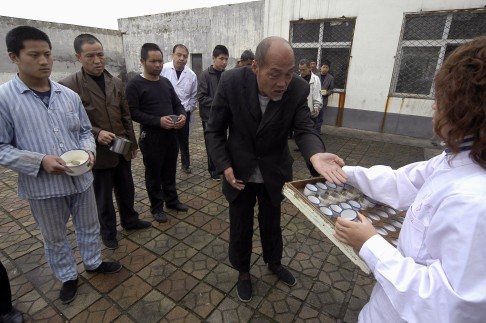Healthy patients can be kept in for years because families won’t accept them back or hospitals fear being sued if there’s accident after discharge

After a quarrel with his father more than 10 years ago, Xu Wei found himself in the Qingchun Psychiatric Rehabilitation Hospital in Shanghai.
“The hospital insists my brother should pick me up and said I am not able to deal with the discharge procedures. But in fact I can do all these things,” Xu told the Sunday Morning Post.

Last year, the mainland passed a mental-health law aimed at preventing a person from being wrongfully locked up on a psychiatric ward. But for people already inside the system who should be released – who desperately want to get out – the law offers little help.
“Since the law was promulgated, involuntary hospital admissions have become almost impossible, except in cases where the patients are seriously mentally disturbed,” said Dr Xie Bin , vice-president of Shanghai Mental Health Centre. But he admits that problems in hospital discharging have become “prominent”.
The law now details procedures for hospital admission but says little about the discharge process, except that patients unable to handle it themselves require their guardian’s consent.
Xie said that in many cases after psychiatric hospitals informed guardians that patients could be released, they didn’t show up. Patients ended up staying unnecessarily, sometimes for 10 years or more.


Some hospitals are concerned that if a person is discharged and later hurts himself or someone else, relatives will try to sue the hospital.
“However, if a patient dies from a physical illness, relatives show up and require the hospital to offer compensation,” he said.
Last year, the Beijing Youth Daily quoted Li Wenxiu, deputy -director of the capital’s Haidian district mental health hospital, as saying about half its 300 inpatients should be discharged based on the hospital’s own assessment. But when they called relatives, they opposed the release. Such patients are trapped.
Huang Xuetao , a public-interest lawyer from the Equity and Justice Initiative, a non-governmental organisation in Shenzhen, said guardians’ concerns about taking a patient home were understandable given societal views on mental health and the lack of support.
“But forced committal should be stopped immediately,” she said. “Medical resources are wasted and tens of thousands of people are mistakenly locked up, with their personal freedom infringed, dignity disrespected and life’s value gradually lost.”

Xie said a “community-based” psychiatric rehabilitation network was needed so patients could return home. “It wouldn’t cost their families much time or money,” he said.
One of the problems at the Qingchun facility, Xu said, was the lack of medical care. The facility, which is privately run, refuses to send patients out for check-ups if they fall ill. He once pulled out a tooth because there was no dentist inside the hospital. Another time, he used a needle to pierce bubbles that had formed on his feet after antibiotics he was given failed to get rid of them.
Life in the hospital is boring. Patients are forced to sleep 16 hours a day and there is little to do even when they are awake.












